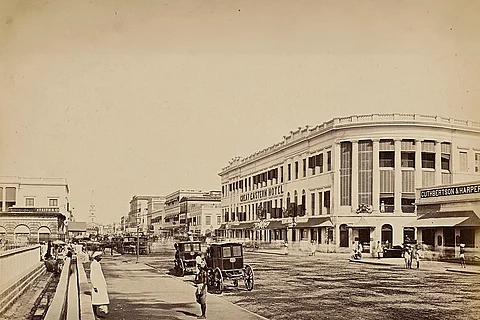
- Destinations
- Experiences
- Stay
- What's new
- Celebrating People
- Responsible Tourism
- CampaignsCampaigns
- SubscribeSubscribe
- Buy Now

In 1888, while travelling through Calcutta, British poet and writer Rudyard Kipling stayed at the Great Eastern Hotel in the centre of the city. Now known mostly for "The Jungle Book" (1894), Kipling was born in Bombay and lived and worked in India for many years.
Calcutta failed to impress him. In "The City of Dreadful Night," Kipling complained about its overcrowded streets, impolite policemen and tram conductors, belligerent politicians, and most of all, a foul smell that hung in the air. The Great Eastern was, however, a refuge and charmed him with its grandeur.
“The Great Eastern hums with life through all its hundred rooms,” wrote Kipling. “Doors slam merrily, and all the nations of the earth run up and down the staircases. …Fancy finding any place outside a Levée-room where Englishmen are crowded together to this extent! Fancy sitting down seventy strong to tâble d’hôte and with a deafening clatter of knives and forks! Fancy finding a real bar whence drinks may be obtained!”
Opened in 1840, by confectioner David Wilson, the property was first called “Auckland Hotel," after the then Governor General of India, Lord Auckland. Calcutta was then the seat of the East India Company and the administrative headquarters of the British Indian empire. It was also a major port, a cosmopolitan urban centre, and often referred to as the second city of the British Empire, after London.
The Great Eastern—once known as the "Jewel of the East"—often hosted the Who’s Who visiting the city, such as Mahatma Gandhi, British sovereign Queen Elizabeth II, Soviet leaders Nikita Khrushchev and Nikolai Bulganin, and perhaps even Ho Chi Minh, the leader of the Vietnamese communist revolution. American novelist Mark Twain described it as “the best hotel east of Suez.”
Even though its management was taken over by the state government in the late 1970s, it remained one of the top three hotels in the city till it was privatised and closed for renovation in 2006. It reopened in 2013.
In the 2014 film "The Grand Budapest Hotel," filmmaker Wes Anderson explores a lost era of opulent hospitality. The film’s stylised cinematography and design, nestled story-within-story structure, and evocation of nostalgia for a pre-World War II central Europe, create a “sense of unreality or fantasy,” writes American film scholar Rick Zinman in his article “The Fantasy World of The Grand Budapest Hotel” (2024).
The audience of the film is aware that the world they are watching on the screen is irrevocably lost—perhaps it never existed. And that’s what makes it even more desirable.
But half a century before Anderson, the Bengali novelist Mani Shankar Mukherjee, better known by his nom de plume Sankar, had romanticised the Great Eastern Hotel in his 1962 novel "Chowringhee."
In an interview, Shankar described how he discovered Chowringhee, the thoroughfare in central Kolkata that gave its name to his novel. Starting out as a street hawker and typewriter cleaner, he was hired, almost by luck, by British lawyer Noel Barwell.
“I was 17 and in constant awe of Noel. But he treated me like a friend and exposed me to the ‘high life’ of the rich and famous,” said Shankar. While accompanying Barwell, he often stayed at the servants’ quarter of the Great Eastern, where he had “a greenroom view of cabaret dancers, the private lives of celebrities…” It inspired him to write the novel, where the hotel is called "Shahjahan."
The narrator of the novel is also called Shankar, and he starts out as a typist. Soon, he is taken under the wings of the enigmatic receptionist Sata Bose. The novel bursts at the seams with a host of out-of-the-ordinary dramatis personae. The imposing hotel manager Marco Polo, a Greek orphan raised by Italian priests; a frequent guest, airhostess Sujata Mitra; hostess Karabi Guha; private detective Byron; and the launderer Nityahari, who literally washes dirty linen.
The novel was first adapted for cinema in 1968. Directed by Pinaki Bhushan Mukherjee, it starred Uttam Kumar, arguably the biggest star in the history of Bengali cinema, in the role of Sata Bose. Film scholar Sayandeb Chowdhury, in his essay “A post-colonial iconi-city: Re-reading Uttam Kumar’s cinema as metropolar melodrama” (2020), writes: “Chowringhee symptomises the end of a period in Calcutta’s history when the last vestiges of the colonial city are noticeably in retreat, grace and civility is slowly making for rampant vulgarism.”
The continued appeal of the novel, however, is evident from the fact that it was adapted again, in 2019, by National Award-winning filmmaker Srijit Mukherji. Mukherji called his film "Shah Jahan Regency." Though the film evokes the nostalgia of the older film, it is not a period piece. Instead, it is set in its contemporary Kolkata.
“A lot of Kolkata has changed,” Mukherji told Scroll.in. “Its values, its ethos, and its demographic… The hotel industry has changed. The city has become darker…”
But the nostalgia persists.
As tourism scholar Ranjan Bandyopadhyay writes in his paper “Consuming colonial nostalgia in Kolkata, India” (2022), nostalgia for an imagined colonial past (perhaps fuelled by popular TV shows such as Downton Abbey) continues to drive tourism in Calcutta, with many young tourists checking into the Great Eastern. One of them even tells Bandyopadhyay: “Our room has an aura of itself. Every inch of the room smells like something I can’t explain. It has the feeling of royalty.” A fry cry from the obnoxious odours that had bothered Kipling, one assumes.
